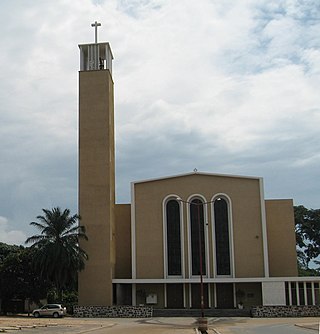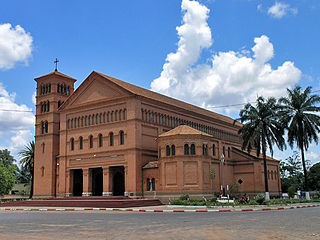
Lesotho, formerly the Kingdom of Lesotho, is a landlocked country in Southern Africa. As an enclave of South Africa, with which it shares a 1,106 km border, it is the only sovereign enclave in the world outside of the Italian Peninsula. It is situated in the Maloti Mountains and contains the highest peak in Southern Africa. It has an area of over 30,000 km2 (11,600 sq mi) and has a population of about 2 million. Its capital and largest city is Maseru.

Demographic features of the population of Lesotho include population density, ethnicity, education level, health of the populace, economic status, religious affiliations and other aspects.

The Sotho, also known as the Basotho, are a prominent Sotho-Tswana ethnic group native to Southern Africa. They primarily inhabit the regions of Lesotho and South Africa.

Moshoeshoe I was the first king of Lesotho. He was the first son of Mokhachane, a minor chief of the Bamokoteli lineage, a branch of the Koena (crocodile) clan. In his youth, he helped his father gain power over some other smaller clans. At the age of 34 Moshoeshoe formed his own clan and became a chief. He and his followers settled at the Butha-Buthe Mountain. He became the first and longest-serving King of Lesotho in 1822.

The Catholic Church in Lesotho is part of the worldwide Catholic Church, under the spiritual leadership of the Pope in Rome.

Christianity is Indonesia's second-largest religion, after Islam. Indonesia also has the second-largest Christian population in Southeast Asia after the Philippines, the largest Protestant population in Southeast Asia, and the third-largest Christian population in Asia after the Philippines and China, followed by India. Indonesia also has the second-largest Christian population in the Muslim world, after Nigeria, followed by Egypt. Indonesia's 29.1 million Christians constituted 10.49% of the country's population in 2022, with 7.43% Protestant and 3.06% Catholic. Some provinces in Indonesia are majority Christian. In Indonesia, the word Kristen refers to Protestantism, while Catholicism is referred to as Katolik. In the 21st century the rate of growth and spread of Christianity has increased, especially among the Chinese minority.

Christianity is the largest religion in Botswana. However, the country is officially secular and allows freedom of religious practice.

Christianity is the most widely professed religion in Zimbabwe, with Protestantism being its largest denomination.

Christianity is the predominant religion in Eswatini, with Protestantism being its largest denomination.
Religion in Guinea-Bissau is diverse, with no particular religion comprising an absolute majority of the population. Islam is the most widely professed faith, and significant populations of Christians and adherents of traditional African religions are also present in the country.

Christianity is the predominant religion in Gabon, with significant minorities of the adherents of Islam and traditional faiths.

Religion in Eritrea consists of a number of faiths. The two major religions in Eritrea are Christianity and Islam. However, the number of adherents of each faith is subject to debate. Estimates of the Christian share of the population range from 47% and 63%, while estimates of the Muslim share of the population range from 37% to 50%.

Christianity is the predominant religion in Kiribati, with Catholicism being its largest denomination.

Joseph Gérard, OMI was a French Catholic priest and a professed member from the Missionary Oblates of Mary Immaculate; he worked in the missions among the Basotho people in Lesotho and the Free State province of South Africa. His works in the mission are now attributed to a partial degree to a boom in Catholicism in Lesotho, where he was well-known and regarded for his extensive work; he was even working up until a month prior to his own death just before World War I.

Haiti is a majority Christian country. Figures in 2020 suggest that 93% of the population belong to a Christian denomination.

Religion in Burundi is diverse, with Christianity being the dominant faith. Catholicism is the largest Christian denomination in the country.
Modderpoort, also known as Lekhalong la Bo Tau or ‘The Pass of the Lions’, is the site in the eastern Free State, South Africa, where the Anglican Missionary Brotherhood, the Brotherhood of St Augustine of Hippo, was established by Bishop Edward Twells in the late 1860s. It is also associated with the BaSotho prophet ‘Mantsopa, while the ‘sacred landscape’ in the vicinity includes San rock painting sites.

Christianity is the majority religion of the Democratic Republic of the Congo and is professed by a majority of the population.

Christianity is the dominant religion in South Africa, with almost 80% of the population in 2001 professing to be Christian. No single denomination predominates, with mainstream Protestant churches, Pentecostal churches, African initiated churches, and the Catholic Church all having significant numbers of adherents. Importantly, there is significant and sustained syncretism with African Traditional Religion among most of the self-professed Christians in South Africa.

'Mantsopa Anna Makhetha (1793–1908), often referred to as 'Mantsopa, was a Basotho prophetess, rainmaker, and storyteller. She advised King Moshoeshoe I and predicted the outcomes of several battles, including the Battle of Viervoet in 1851 and the Battle of Berea in 1852. She was exiled to Modderpoort in the late 1860s, where she converted to Christianity and was baptised in 1870. She fused Christianity with her own traditional Basotho customs.


















